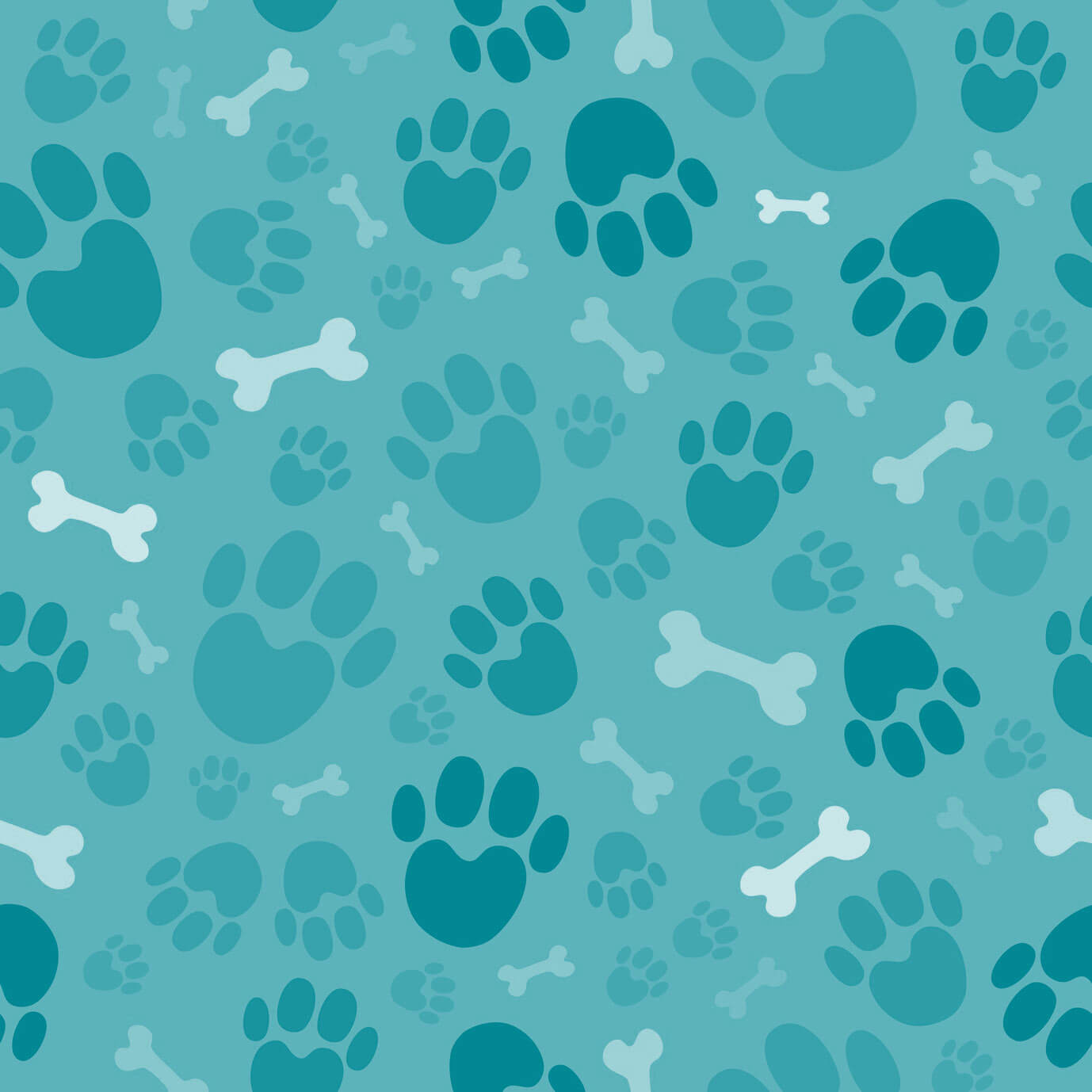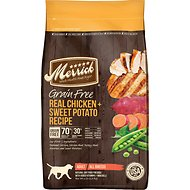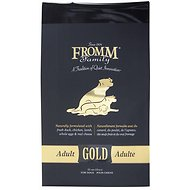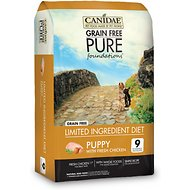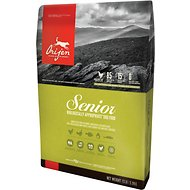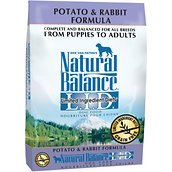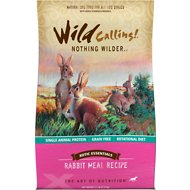The Ultimate Bearded Collie Food Buyer’s Guide
The Bearded Collie, or “Beardie” as they are affectionately known, is one of the many sheep herding breeds that originated in the northern part of the Great Britain – mostly in Scotland and northern England, but also, to some extent, in Wales. Collies (from “colley” – perhaps from Gaelic words for dog: càilean and cóilean) are so common and have existed for so long in these areas that they should be considered a landrace breed. A landrace breed is a widespread, domesticated, locally-adapted, traditional variety of a species that has developed over time. The Scotch Collie, ancestor of many collie breeds today, may be considered a landrace breed. The Rough Collie, the Border Collie, and the Bearded Collie are all purebred breeds which have been developed from this landrace collie that has been known in northern Britain for hundreds of years (or longer).
Herding sheep and other farm animals, as well as guarding the home, have been important for all herding dogs and the local collies were always very good at these jobs. But Scottish shepherds were always looking for ways to improve their dogs. According to the history of the Bearded Collie, a Polish merchant named Kazimierz Grabski traded a shipment of grain for sheep in Scotland in 1514. He brought along six Polish Lowland Sheepdogs (known as PONs today – for the name of the breed in Polish) to move the sheep. A Scottish shepherd was so impressed with the herding ability of these sheepdogs that he traded several sheep for some of the dogs. The Polish dogs were subsequently bred with some of the local Scottish dogs to produce what we know today as Bearded Collies. Of course, at this time there were no distinctions made between the different collies so it’s just as likely that some of the genes from the PONs dogs were spread throughout the collies in Scotland. People at that time were interested in getting dogs that could do a good job herding sheep and doing other farm work. Pedigrees and appearance weren’t that important.
It wasn’t until the 19th century that breeders began to specialize with the dogs more and the breeds branched off into the Border Collie, the Bearded Collie, the Collie (Rough and Smooth), the Shetland Sheepdog, and other various sheepdogs, all from the same original collie-type dogs. The breeds have different working styles and some of them are favored more for work today, such as the Border Collie. Other collie breeds are kept mainly as pets now.
Most people agree that the modern Bearded Collie dates back to 1944 and Mrs. G. Olive Willison. Mrs. Willison, expecting a Shetland Sheepdog, received a female Bearded Collie (Jeannie of Bothkennar) by accident. She was fascinated by the dog and began searching for a mate for breeding purposes. Jeannie’s offspring and a few other bloodlines formed the basis of the modern breed.
You can find more detailed historical information about Beardies on the web site for the Bearded Collie Club of America, including some historic images.

The Bearded Collie has an outer coat that protects him against the elements and a soft, warm undercoat. He has a full shed once a year.
Bearded Collies became popular in the latter part of the 20th century, possibly due to one of the breed (Potterdale Classic at Moonhill) winning Best In Show at Crufts in 1989.
The Beardie was recognized by the American Kennel Club in 1976. Today Beardies are the 126th most popular breed in the United States, according to AKC registrations.
The Bearded Collie is a good-natured dog and they make a very good family pet. They usually have lots of personality. They are bouncy (a word often used to describe the breed), charismatic, and friendly. Most Bearded Collies are kept as pets and show dogs today but some dogs still work on farms.
Beardies do have a high energy level so they are not the best choice if you live a sedentary lifestyle. However, if you (or your family) enjoy an active lifestyle and can provide a dog with plenty of exercise and activity, a Bearded Collie could be a good pet. They are excellent at sports such as dog agility, rally, treibball (a form of dog soccer), and obedience trials, among other events. They also make good therapy dogs. You and your Beardie can also take part in herding tests which many dogs enjoy since it lets them use their natural instincts. Like other collie breeds, Beardies are very intelligent but they tend to be independent thinkers. They can become bored easily if training is too repetitive so it’s important to keep training fun and to do new things with your Beardie. According to some sources, Beardies can be a little stubborn at times.
Both male and female Beardies usually get along well with children, especially if they are raised with them. You do need to be careful if you have a toddler or if there are elderly people in your home. Some Beardies can be very enthusiastic or even rowdy at times just because they are so happy. You need to make sure that your exuberant dog doesn’t knock over a small child or older person. You should always supervise small children when they are around dogs, even very friendly dogs. Accidents happen.
Beardies are usually very good with other pets. Do keep in mind that Bearded Collies are herding dogs. Like most herding dogs they can have a tendency to try to herd other pets (or children) at times. They may even nip at heels to try to bunch all of your pets and children in a group.
Beardies are not normally bad about barking but they will bark if they consider there is something afoot. They are not silent dogs.
You can find more details about living with Beardies on the Bearded Collie Club of America site.
Beardies have a flat, shaggy outer coat and a soft, furry undercoat. Their coat typically falls to either side of their body from their back. They tend to have long hair on their face and under their chin, giving the appearance of a beard, which gives the breed its name. Because of their longer coat they do require regular brushing to keep their hair free of mats. Some owners prefer to keep Beardies in a short “puppy” cut so they don’t have to do as much brushing and grooming. You should expect your Bearded Collie to shed but regular brushing will cut down on loose hair. Adult Beardies experience a full coat shed approximately once a year. During this period, which lasts two to four weeks, it may be desirable to brush your dog more frequently.
Disclosure: Please note that this post contains affiliate links, which will direct you to our partner sites. If you purchase the pet foods we recommend through those links, we may earn a small commission – at no extra cost to you.
Quick Look : Top 4 Best Dog Foods for Bearded Collie
| Food | Price | Nutrition | Rating |
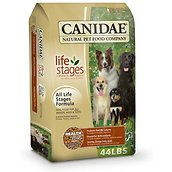 Canidae All Life Stages Chicken, Turkey, Lamb & Fish Meals Formula Canidae All Life Stages Chicken, Turkey, Lamb & Fish Meals FormulaRead Reviews |
$1.36/lb |  |
 |
|
Merrick Grain Free Real Chicken & Sweet Potato Dry Dog Food |
$2.16/lb |  |
 |
|
*New Formula* ACANA Grasslands Regional Formula Grain Free Dry Dog Food |
$3.08/lb |  |
 |
|
|
$1.41/lb |  |
 |
Bearded Collie Diet & Nutrition
The Bearded Collie is a medium-sized dog. Males usually range 21 to 22 inches at the withers; females are slightly less at 20 to 21 inches. Weight varies with size and sex, but adults average between 45 to 55 pounds.
As mentioned earlier, Bearded Collies tend to be very active dogs. They have plenty of energy and need to use it. You will need to take this activity level into consideration when determining how many calories your Bearded Collie needs, especially if you are doing any training or work with your Beardie, such as agility or herding.
Growing puppies and young adults use a lot of energy. They require a diet that features good quality protein. According to the National Research Council of the National Academies, an active adult Bearded Collie weighing 50 pounds requires an average daily caloric intake of 1312 calories. Dogs that have been spayed/neutered, or that are older, may need slightly fewer calories. Some dogs may need more calories depending on their level of activity and their individual metabolism. If you and your Beardie are doing agility training or training for a herding test, you may need to bump up your dog’s daily calories to 1457 to 2186 kcal/day (50 lb dog), depending on how much training/work he is doing. Growing puppies will also consume more calories than adult dogs and so do young adult dogs. A Bearded Collie puppy weighing 30 pounds (4-12 months of age) needs an estimated 933 calories per day.
Since Beardies are a medium-sized dog, it’s not hard to find many good foods that are appropriate for their size. You also have many choices for Bearded Collie puppies since they don’t normally have any special food requirements – they are not large breed, small breed, etc.
You can choose a puppy food that is made for all puppies. Most breeders recommend feeding this food until your puppy reaches about 90 percent of his adult size. You can also feed an all life stage dog food (sometimes AAFCO-approved for “growth and reproduction”) to puppies. Just make sure to check the nutrients to make sure they are suitable for puppies – especially the calcium levels and calcium to phosphorus ratio. You should talk to your breeder about the food they recommend for their puppies since they usually have experience with how their puppies grow and develop. Not all puppies will grow at the same rate, even in the same breed, so your puppy’s breeder is usually your best source of advice.
Feeding Your Bearded Collie
According to the Bearded Collie Club of America, allergies can occur with Bearded Collies, though, like most other health issues in the breed, they do not occur with a high percentage of dogs. If your Beardie does have an allergy it’s a good idea to work with your veterinarian to identify the trigger(s). Keep in mind that there are different kinds of allergies: inhalant, contact, flea bite, and food. Many dog lovers automatically think of food allergies when you mention allergies, but flea bite allergies and inhalant allergies actually account for far more allergic reactions in dogs than food allergies. So, if your Beardie seems to be having an allergic reaction, with itching, scratching, redness, etc., it may not be due to the food he’s eating. On the other hand, it’s possible that it could be food-related.
If it turns out that your Bearded Collie does have a food allergy, working with your veterinarian can help you identify the specific ingredients that trigger your dog’s reaction so you can avoid it. However, you should be aware that if your dog does have a food allergy, there is a good chance that he will develop reactions to more foods/ingredients as he gets older. You will probably have to change food again in the future so be alert to your dog’s reaction to his food.
If your Bearded Collie has problems with diarrhea, vomiting, flatulence, or a gurgly stomach when he eats, this is not a food allergy. It’s a food sensitivity. If you’ve seen the movie Along Came Polly with Ben Stiller and Jennifer Aniston, you probably recall the scene where they eat at an ethnic restaurant and Ben Stiller’s character is in agony. Some people – and dogs – have sensitivities to certain foods and spices. If your Beardie has a food sensitivity you will need to try to determine the cause so you can avoid the ingredient(s). It’s often a good idea to feed a dog with a food sensitivity a food with a minimal number of ingredients so there is less chance of giving him something that could upset his gastrointestinal system. Keep his food simple and fairly bland.
Whether you feed your dog a food with or without grains is a personal choice. Many people choose grain free dog foods because their dogs have digestive problems, food allergies or sensitivities, or skin problems. You may want to avoid the most common grains, such as corn and wheat which are often over-used in dog foods, but there are many good dog foods that use alternative grains/cereals such as oats and barley. You can try a couple of foods, with and without grains, and see how your dog does on the foods so you can make your decision.
Keep in mind that food allergies are based on the proteins in foods and not carbohydrates. The most common dog food allergens are: beef, dairy, chicken, lamb, fish, corn, wheat, and soy. While we usually think of ingredients such as corn and wheat as sources of carbohydrates, these cereals/grains also contain proteins. When dogs (or people) have allergies to these ingredients, they are typically reacting to the proteins. There can be other reasons to avoid lots of carbs in your dog’s diet, but food allergies are related to proteins in foods, even in non-meat ingredients.
Otherwise, try to feed your Bearded Collie a good quality diet that has good sources of meat protein. It’s easier for a dog to digest good meat protein than protein that comes from poor quality sources of animal protein that may be found in some cheaper dog foods. Dogs also digest animal protein more easily than plant protein for the most part. (Sure, a pet food company can cook peas and lentils to a mushy consistency to make them easier to digest but your dog will get more complete nutrition from animal protein and it will agree with him better.) This doesn’t mean you have to buy the most expensive dog food available but you should look for good quality foods with good quality ingredients. They are better for both the short-term and long-term health of your dog.
It’s also a good idea to select a food that has fewer carbohydrates. Contrary to popular belief, this doesn’t necessarily mean grain free. Many grain free dog foods are loaded with carbs. Potatoes and sweet potatoes, for example, can send carb percentages very high. And some dog foods with grains have modest amounts of carbohydrates. We recommend doing a little math when you’re considering a dog food and figuring out the dry matter basis so you can tell what the actual protein, fat, and carbohydrate percentages are in a food.
For medium and larger size dogs, it’s usually easier on the pocketbook to feed kibble instead of canned food. Kibble costs less per ounce than canned food. Canned food can have more protein than kibble but some dry dog foods today have extremely high percentages of meat protein. They can also be very expensive. Again, some of these things are personal choices that you have to make for yourself depending on your budget. You can find very good kibbles with good meat protein for reasonable prices, especially if you order online from sites like Chewy.com. We always recommend that you figure the dry matter basis for the foods you are considering, whether they are canned or kibble, so you can make a good comparison of the protein, fat, fiber, carbs, and other nutrients.
We also suggest that you measure the amount of food you feed your dog instead of free feeding. Free feeding – or leaving the food sitting out all day – tends to encourage dogs to overeat which can lead to obesity. Even active dogs like Bearded Collies can become overweight. Adult Bearded Collies usually do well eating two meals per day. You can feed Beardie puppies 3-4 meals when they are very young, then move to three meals per day as they get older. By the time they are about a year old they should be eating two meals per day.
Theoretically, when you buy and feed better quality dog food you feed your dog less food. Unfortunately, we do not find that to always be the case. If you are used to feeding two scoops of the old food, for example, you may continue to dish out two scoops of the new ultra super max premium dog food – which has double the calories. And your dog happily eats all the food. Next thing you know, Fido is the size of a house. If you are switching foods, make sure you check the label and see how many calories the food has. Have a good idea how much food you need to feed so you don’t accidentally overfeed your dog. It’s very easy for a dog to become overweight before you really notice!
And, of course, keep plenty of fresh water available for your dog at all times. Grain free foods with high protein percentages, especially, can make dogs very thirsty, so keep the water bowl full.
Bearded Collie Health Problems
In general, Bearded Collies are considered to be a healthy breed. According to the Bearded Collie Club of America (BCCA) and health surveys, there are some health problems in the breed but they do not affect high numbers of dogs. Health issues that occur in the breed include allergies (see above), hip dysplasia, hypothyroidism, auto-immune disease, and some eye problems. Other issues in the breed are the same issues that commonly affect all dogs.
The club recommends the following health tests for Bearded Collies:
Eye examination by a boarded ACVO Ophthalmologist each year, results registered with the OFA.
OFA evaluation from an approved laboratory each year until 5, thereafter every 2 years
You can see test results reported to OFA for Bearded Collies in this table:
Evaluations through December 2016
|
Registry |
Rank |
Evaluations |
Percent |
Percent |
Percent |
Percent |
|---|---|---|---|---|---|---|
|
ADVANCED CARDIAC |
N/A |
1 |
.0 |
100.0 |
.0 |
.0 |
|
CARDIAC |
4 |
69 |
4.3 |
89.9 |
.0 |
5.8 |
|
COLLIE EYE ANOMALY |
N/A |
3 |
.0 |
100.0 |
.0 |
.0 |
|
DENTITION DATABASE |
N/A |
2 |
.0 |
100.0 |
.0 |
.0 |
|
ELBOW |
84 |
764 |
2.4 |
97.4 |
.0 |
.3 |
|
EYES |
82 |
230 |
1.3 |
98.7 |
.0 |
.0 |
|
HIPS |
141 |
4791 |
6.3 |
92.8 |
.0 |
.9 |
|
PATELLA |
N/A |
17 |
.0 |
100.0 |
.0 |
.0 |
|
SHOULDER |
N/A |
2 |
.0 |
100.0 |
.0 |
.0 |
|
THYROID |
88 |
839 |
1.8 |
86.9 |
.0 |
11.3 |
Bearded Collie Statistics from the OFA database
Other charts on the OFA web site show a great reduction in abnormal elbows in the breed since 1985; and a remarkable trend toward Excellent hips since 1980, along with a reduction in abnormal hips since that time.
In case you are wondering, the Bearded Collie is not one of the breeds affected by the MDR-1 gene that results in sensitivity to certain drugs, such as ivermectin, though many related collie breeds are affected.
The BCCA has some excellent articles about health issues in the breed on their web site, including some pages on Bearded Collie nutrition. We recommend that you look through these articles if you are interested in getting a Beardie.
Beardies have an average lifespan of 12 to 14 years but it’s not unusual for some Beardies to live longer than this. Many Beardies seem to stay youthful even after they become seniors. It’s not unusual for a 12-year-old dog to still be very active. Longevity is something that you should talk to breeders about when you meet them and their dogs.
Remember that most dogs do not major have health problems. Breeders work diligently to test and screen their dogs so they produce healthy puppies. But no one can completely guarantee that every dog will be healthy throughout their lifetime. If you are interested in getting a puppy or dog, be sure to talk to the breeder about their dogs and their health guarantees.
Along with good breeding practices, health testing, and good vet care, many dog lovers try to keep their dogs healthy by feeding dog food that has more natural ingredients. There is a belief that this can help keep a dog’s immune system stronger. Many people recommend feeding a food that is free of some of the most common food irritants such as corn, soy, and wheat. These are not the most common dog food allergens – beef, dairy products, and chicken, for example, lead to more food allergies for dogs than corn, soy, and wheat. But many people like to avoid soy and grains in dog foods. There are many good grain free dog foods today if you want to feed one to your dog. Avoiding artificial colors, flavors, sweeteners, and preservatives is also suggested as a way to help keep the immune system stronger.
Ingredients to Look for and Some to Avoid
As with most dogs, when choosing a food for your Bearded Collie you should look for a food that has good sources of protein and fat.
Ideally you will select a dog food that features two or three meat proteins in the first several ingredients listed. It’s not unusual today to see a food list both chicken and chicken meal, for example, as the first two ingredients. Both whole meats and meat meals are good sources of protein. Whole meats refer to foods such as whole chicken, beef, fish, and lamb. Some people don’t like meat meals as much as whole meats but they are a concentrated form of the meat in which the moisture has been removed. They contain several times as much protein as a whole meat. Meat meals are usually quite acceptable as one of the first ingredients in a good quality dog food. They are used by many good dog food brands. Some companies will go a step further and also add a related organ meat. For example, if the first two ingredients are whole chicken and chicken meal, they may also add chicken liver. That’s fine. This is one way of adding more protein to the food. Most dogs will enjoy foods that have liver added. It is best if the liver is named. We don’t like to see generic liver. It’s important to remember that liver, hearts, kidneys, lungs, and so on are technically meat by-products so you always want the dog food manufacturer to be as specific as possible about the ingredients they are using.
Many dog foods today, even some of the most expensive and highly touted, use lots of plant proteins such as lentils and peas. These foods often have high protein percentages on the label. When you read the guaranteed analysis it’s important to consider how much of the protein in the food comes from meat and how much comes from plants. Your dog is able to digest meat protein more easily than plant protein. Meat protein is a much more natural source of protein for your dog than plant protein.
Dogs also need good sources of fat. You should look for named fat sources such as chicken fat. Other named fats also provide needed nutrients such as fish oil which can provide omega-3 fatty acid to help keep the skin and coat healthy. Puppies can benefit from DHA which is Docosahexaenoic acid. This is a specific form of omega-3 fatty acid that helps with brain and eye development. Older dogs seem to benefit from medium chain triglycerides which feature medium chain fatty acids (MCFAs). These have been found to help older dogs feel and act younger. They are often made from a combination of coconut oil and other oils.
If you want to avoid corn, soy, and wheat in your dog food, your Beearded Collie may still be able to eat an alternative grain such as barley or oats. Or you can feed a grain free dog food that uses an alternate source of carbs that is low glycemic. You don’t have to feed a dog food with an excessively high percentage of protein but it’s a good idea to keep the carb percentage low to moderate.
If your Beardie has a food allergy or food sensitivity, you may need to work with your veterinarian to identify the food triggers unless they are very obvious. There are lots of good foods with alternative meat proteins today as well as limited ingredient diets which we will discuss below.
Recommended Dog Food For An Adult Bearded Collie
Bearded Collies should be able to eat most good quality dog foods but every dog is an individual. Even dogs in the same breed can have different food needs. Some dogs need more calories than others. Some dogs will do better with more protein or fat than other dogs. We are providing several suggested foods for your Beardie which meet our standards but you may have to use a trial and error method to see which food your dog does best on. Even among Beardies, some dogs are more energetic than others.
When you are trying a new food, be sure to allow several days to slowly transition to the food, mixing in a little of your dog’s old food each day. Of course, if your dog shows signs that he doesn’t like the food or doesn’t tolerate it, you will have to make adjustments. If your dog eats the food but you don’t like his condition after a few weeks, you can change him back – slowly – to his previous food. It’s best not to go directly to another new food. You can upset your dog’s gastrointestinal system if you keep changing to too many new foods in a short period of time. Once your dog has settled back with his old food, you can once again try a new food. You should allow at least a couple of weeks between foods before trying another new food so you can give your dog’s system a chance to rest and recover. This also gives the new food a fair chance.
If you try a new food and your dog doesn’t seem enthusiastic about it, you might also try another food from the same product line that uses a different kind of meat protein or other ingredients. As long as the guaranteed analysis and nutrient percentages are similar, the food should be similar to the original food you selected.
When you are feeding a new food and your dog is eating it without problems, it’s important for you to assess his physical condition. Is he gaining or losing weight on the new food? Does his coat look healthy? Are his eyes bright? Does he seem to have good energy or is he more lethargic than usual? And, the big question for any dog lover – what does his poop look like? As most dog lovers know, you can tell a lot about a dog’s health by checking his poop. Does it look normal and firm? If he having regular bowel movements? Those are good signs. If your dog is having runny poop or diarrhea; or if he is having trouble with his bowel movements, it could be because of the new food. These are all things you should note during the first few weeks of feeding a new food. Even if your dog LOVES the food, if he’s not thriving, you may have to rethink his diet or how much you are feeding him.
Very often, if a dog has loose stool or other gastrointestinal problems with a food, even if he really likes the food, it can be because you are 1) feeding too much of the food; or 2) the food is too rich. What does too rich mean? It means the food may have too many calories for your dog’s needs. It might have too much fat for your dog. Or, the protein percentage may be too high. You can also check the fiber percentage. Maybe it’s too high. If cutting back on the portions doesn’t help, you need to try changing the food.
Most of the foods we have selected here do not contain corn, wheat, or soy, unless noted. You may have to try a couple of foods to find which one is best for your dog. You should also keep in mind that your dog’s dietary needs can change as he grows and ages so you may have to change foods to suit him.
Best Dog Foods for Bearded Collie Adults
| Food | Price | Nutrition | Rating |
 Canidae All Life Stages Chicken, Turkey, Lamb & Fish Meals Formula Canidae All Life Stages Chicken, Turkey, Lamb & Fish Meals FormulaRead Reviews |
$1.36/lb |  |
 |
|
Merrick Grain Free Real Chicken & Sweet Potato Dry Dog Food |
$2.16/lb |  |
 |
|
*New Formula* ACANA Grasslands Regional Formula Grain Free Dry Dog Food |
$3.08/lb |  |
 |
|
|
$1.41/lb |  |
 |
Canidae All Life Stages Chicken, Turkey, Lamb & Fish Meals Formula
This Canidae formula is an all life stages food so you can feed it to dogs of all ages. The first five ingredients are: Chicken meal, turkey meal, lamb meal, brown rice, and white rice. The food does contain grains (rice, oatmeal, barley) but even many dogs that have problems with corn or wheat can eat these grains which provide dietary fiber. The food contains no corn, wheat, or soy. The food is naturally preserved and it contains pre- and probiotics for healthy digestion, along with antioxidants and omega 6 and omega 3 fatty acids for good skin and coat. The guaranteed analysis shows 24 percent crude protein; 14.5 percent crude fat; and 4 percent crude fiber. It has 468 kcal/cup. We think this is a good food for dogs that do well on moderate protein and fat. Canidae has had a good reputation for many years.
Merrick Grain Free Real Chicken & Sweet Potato Dry Dog Food
If you would like a higher protein percentage for your Bearded Collie, many dog owners like Merrick Grain Free foods. The first five ingredients in this food are Deboned Chicken, Chicken Meal, Turkey Meal, Sweet Potatoes, and Potatoes. This recipe is an all life stage food with 460 kcal per cup ME (metabolizable energy) on an as fed basis (calculated). It has 70 percent meat ingredients, 30 percent vegetables, vitamins, and minerals. It is grain free – no corn, wheat, or soy. No gluten. No ingredients from China. It has 38 percent crude protein and 17 percent crude fat, with 3.5 percent crude fiber. It also has glucosamine and chondroitin added, as well as omega-3 and omega-6 fatty acids. Merrick uses local growers from Texas, where the food is made. We think this food has good quality protein and other ingredients for a very active Beardie. Not everyone will like a protein percentage this high but if you do, give this food a try.
New Formula* ACANA Grasslands Regional Formula Grain Free Dry Dog Food
If your Bearded Collie is very active (herding or doing agility, for example), we can also recommend Acana foods. Champion Pet Foods has completed their new kitchen in Kentucky and they have reformulated some of their dog and cat foods to reflect what is now “regional” to the Kentucky area. So, it’s still the same award-winning company, but Acana is being made in Kentucky. We’ve had a chance to review the Acana dog and cat foods and there are some changes in the meat proteins but the foods still look good. If you visit the Acana web site you can view the old and new formulas to see the changes (we really like being able to compare the formulas). The current (old) Grasslands formula, for example, is heavy on lamb, duck, whitefish, and lentils. The new formula will feature goat meal and catfish meal, in addition to the lamb and duck. The old formula has 31 percent crude protein, 17 percent crude fat, 5 percent crude fiber, and 10 percent moisture. The new formula has 33 percent crude protein, 17 percent crude fat, 6 percent crude fiber, and 12 percent moisture. The food has 60 percent animal protein ingredients and 40 percent vegetables, fruits, and botanicals. No grains, potatoes, or tapioca. If you’re looking for a good grain free dog food for your Beardie that is low in carbohydrates, we think that the Acana foods are a good choice. Acana foods typically have slightly less meat protein than Orijen (made by the same company), but we think they’re a good choice for many dogs. Most people still seem to like the Acana foods now that they are being made in Kentucky but if you have questions about them, we recommend talking to people who feed these foods to their dogs for their opinions.
Fromm Adult Gold
If you would like a food with a little less protein, we also like Fromm Adult Gold. This formula has duck, chicken meal, and chicken as the first three ingredients. It has 24 percent crude protein, 16 percent crude fat, and 3.5 percent crude fiber, with 408 kcal/cup. It is AAFCO-approved for growth and maintenance. The food includes salmon oil – a great source of omega-3 fatty acid for healthy skin and coat; probiotics, and prebiotics. No corn, wheat, or soy. The food is also made at the family’s own facilities in Wisconsin. The Fromm family has been making dog food and dog products for over 100 years and they have a great reputation. The food includes brown rice and pearled barley in the first five ingredients. It does contain oatmeal and potatoes so if you are trying to keep the carbs very low you may not like this food. However, we think the ingredients are good quality and many dogs will do well on this food. You can see the technical analysis for the food, with the dry matter basis figures on the site. Fromm also makes their popular Four Star line of dog foods which feature favorites such as Chicken a la Veg and Hasen Duckenfeffer.
Best Dog Foods for Bearded Collie Puppies
Bearded Collie puppies can usually begin eating a puppy food right after they are weaned or they can eat a good all life stage food. If you have questions about how to feed your puppy, we recommend talking to your puppy’s breeder. They usually have the most experience with raising Beardie puppies and can guide you.
Puppy foods should have a calcium to phosphorus ratio of about 1.2 parts calcium to 1 part phosphorus. It’s also important that dog and puppy foods do not have an excess of calcium since this can affect bone growth. If you are feeding your puppy a food that is properly formulated, you should not add any extra calcium, such as milk, cottage cheese, or other calcium supplements. Doing so can lead to serious health problems such as OCD (osteochondritis dissecans) and other orthopedic problems.
Keep in mind that all life stage dog foods are formulated to be nutritionally adequate for growing puppies. Foods for puppies may also have the AAFCO statement that they are approved for “growth and reproduction.”
Here are some of the puppy foods we like for Bearded Collie puppies.
Canidae Grain Free Pure Foundations Puppy Formula
This is one of our favorite foods for all puppies. Canidae Grain Free Pure Foundations Puppy Formula is a limited ingredient food with nine ingredients plus vitamins and minerals and probiotics. It’s grain free with probiotics to help digestion; antioxidants for a healthy immune system; and omega 3 and 6 to support healthy skin and a beautiful coat. The first five ingredients are chicken, menhaden fish meal, lentils, peas, and potatoes. The recipe is supposed to be especially good for puppies with sensitive digestion. The food has 30 percent crude protein, 12 percent crude fat, 4 percent crude fiber, and 10 percent moisture. This food checks in at 520 kcal/cup, so it’s high in calories but active, growing Beardie puppies can usually burn them off. Just remember that you don’t need to feed a lot of food with these very nutrient-dense foods. If your Bearded Collie puppy does well on this puppy food, Canidae has some good adult foods – both grain free and foods with grains.
Fromm Puppy Gold Formula
Similar to Fromm’s Gold Adult formula, this puppy formula contains no corn, wheat, or soy. The first three ingredients are duck, chicken meal, and chicken. The food has moderate protein and fat to encourage puppies to grow slowly. The food has 417 kcal/cup. The technical analysis for the food shows the correct calcium to phosphorus ratio for puppies. The food has 27 percent crude protein; 18 percent crude fat; and 3.5 percent crude fiber. Fromm Puppy Gold formula also has added DHA-rich salmon oil for good brain and eye development in puppies. The USDA-inspected ingredients for the food are delivered fresh each morning. We think this food could be a good choice for Beardie puppies.

The Bearded Collie is a fun-loving, active dog. This fellow has been playing with the rope toy in the photo.
Best Dog Foods for the Senior Bearded Collie
It’s not unusual for many Bearded Collies to live into their teen years. This means that you will probably need to consider what kind of food to feed your dog as he gets older. As your dog ages it’s a good idea to plan an annual senior check-up with your vet. Many older dogs begin to put on pounds as they become less active. For this reason, most senior dog foods have fewer calories and they can skimp on protein. You should watch your older dog’s weight as he gets older to make sure he doesn’t become overweight. In some cases you can simply cut back on the portions of his regular dog food to help him stay fit or increase his exercise.
On the other hand, some very old dogs often start to have some problems metabolizing nutrients, including protein. It can become hard for them to keep good muscle tone and weight as they age. For this reason, you may wish to avoid many dog foods labeled “senior.” These foods are often formulated for older dogs that have gained weight. Instead, look for a senior dog food that has lots of protein. As long as your older dog doesn’t have any problems with his kidneys or with phosphorus, there is no reason to avoid higher protein levels.
It’s very important that senior dogs have good quality protein. Good quality protein is easier to digest and metabolize than poor quality protein. It provides the older dog with more nutrition that he can use. So, plan on giving your older Beardie the very best food possible with excellent sources of protein.
Orijen Senior Dog
Orijen Senior provides plenty of excellent quality protein for your older dog. This food features free-run chicken and turkey, wild-caught fish, and nest-laid eggs. It helps keep older dogs in good muscle even as they become less active. Made of 80 percent meats and fish, the food is low-glycemic and has low carbs to help keep your older dog’s blood sugar steady. The food also contains natural sources of glucosamine and chondroitin to keep your dog’s joints healthy. The food is 38 percent crude protein and 15 percent crude fat. It checks in at 445 kcal per 250ml/120g cup. We think this is a very good food for senior dogs who often need extra protein as they get older. (We know Orijen is expensive but this food really stands out for senior dogs.)

Best Dog Foods for Bearded Collies with Skin Problems
If your Bearded Collie is having skin problems or problems with food allergies, you will probably want to avoid foods that contain known food allergens such as beef, dairy products, chicken, lamb, fish, chicken eggs, corn, wheat, and soy. If your dog is having food allergies – which usually manifest as itching, redness, chewing, hair loss, and sometimes ear problems – you will need to identify the trigger for his allergy. You can try to guess the trigger or work with your veterinarian on a food trial and elimination diet for your dog. You may need to find a novel protein for your dog – a protein that he has not eaten previously. Natural Balance has a selection of limited ingredient diets that can be helpful for dogs with food allergies. You might try giving your dog the rabbit formula, kangaroo formula, venison formula, or bison formula. He should be able to eat a meat protein that he has not eaten previously without having an allergic reaction.
Dick Van Patten’s Natural Balance L.I.D. Limited Ingredient Diets® Potato & Rabbit Dry Dog Formula
This limited ingredient diet food has limited sources of protein and carbs. It’s also grain free and complete and balanced for puppies, adults, and senior dogs. The food should be easy for your Beardie to digest and it contains no artificial flavors, colors, or preservatives.
Wild Calling! Xotic Essentials Rabbit Meal Recipe
Any dog suffering from skin problems or food allergies may benefit from Wild Calling’s Xotic Essentials recipes. Formulas like their rabbit meal recipe use exotic meats that are rare in today’s pet food market so your dog probably hasn’t eaten them before – and has less chance of having an allergic reaction. The foods are also highly digestible. Wild Calling also uses what they call LITe (limited ingredient technology). They don’t use any of the ingredients commonly found in most dog foods such as chicken, grain, gluten, egg, yeast, corn, wheat or soy. If your Beardie has a food allergy, he may benefit from Wild Calling. The foods are formulated for rotational feeding and they offer several Xotic Essentials recipes, such as kangaroo and bison, so your dog doesn’t get over-exposed to one kind of meat protein. This is an All Life Stage food. We think that dogs with skin problems and food allergies can definitely benefit from these recipes.

Best Dog Foods for Bearded Collies with Sensitive Stomachs
Many dogs are susceptible to food sensitivities that affect their digestion and excretion. If your dog has a sensitive stomach it can be an indication of a food sensitivity, which is different form a food allergy. A dog with a food sensitivity will have gastrointestinal issues such as vomiting or diarrhea. Or it could be something more serious.
A dog with a sensitive stomach can often be helped by feeding the right dog food. Sticking to a limited ingredient diet food with as few ingredients as possible can reduce the chance of your dog having a bad reaction to something in the food.


If your dog can’t eat these ingredients, you might try one of the Weruva foods or Acana Singles. Weruva also has lots of foods with pumpkin which can sometimes help a dog with stomach issues.
Best Dog Foods for Overweight Bearded Collies
Beardies are such an active, energetic breed that you may never have a problem with your dog becoming overweight. However, some dogs do slow down as they get older and they may start to put on pounds. You can often help your Bearded Collie lose weight by cutting back on his portions and encouraging him to get more exercise.
If your Beardie needs to lose more than a few pounds, however, you may need to consider a weight control dog food.
We do not recommend a weight control dog food for a puppy or a very old dog. These foods generally have fewer calories and may have some other differences in nutrients that make them inappropriate for growing puppies or older dogs who need special nutrition. Many weight control foods contain a lot of filler ingredients or empty carbohydrates which makes it hard to recommend them.


If your dog needs to lose weight, you should proceed slowly. No crash dieting. You should aim for your dog to lose no more than 3 to 5 percent of his body weight per month or about one percent each week.
Conclusion
Beardies are fun-loving, active, “bouncy” dogs that make very good family pets. The Bearded Collie Club of America says, “A Beardie is boundless energy, heartfelt devotion, and a trusting companion.” They are exuberant and they love their people. These are intelligent, happy dogs who are more than willing to do just about anything you would like to try. If you have that same enthusiasm and you enjoy a dog with this kind of gung-ho attitude, check out the Bearded Collie.
Below is a list of products reviewed in this article
-
Canidae All Life Stages Chicken, Turkey, Lamb & Fish Meals Formula
- Fromm Adult Gold
- Canidae Grain Free Pure Foundations Puppy Formula
- Nulo Freestyle Senior Trout & Sweet Potato Recipe
- Weruva’s Caloric Harmony Venison and Salmon Meal Dinner with Pumpkin
-
Dick Van Patten’s Natural Balance L.I.D. Limited Ingredient Diets® Potato & Rabbit
- Zignature
- Wellness Simple
- Natural Balance L.I.D. Limited Ingredient Diets Sweet Potato & Fish Formula Dry Dog Food
- Fromm Gold Weight Management
- Fromm Gold Coast Grain Free Weight Management Dog Food
